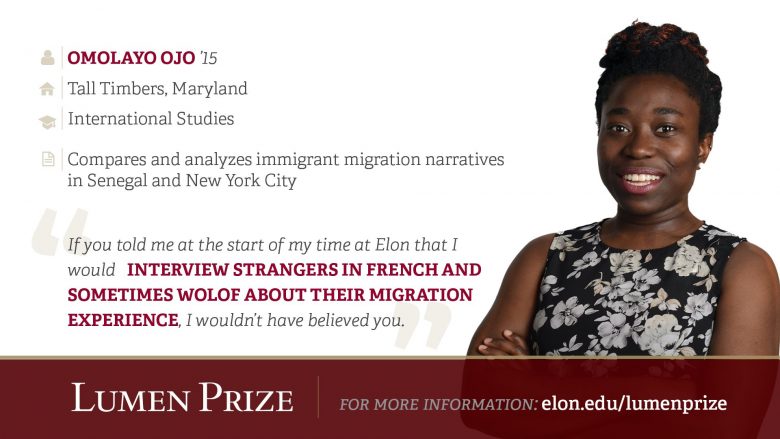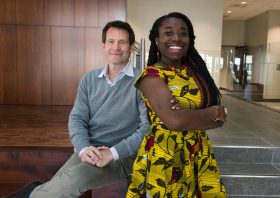Elon University’s top prize for undergraduate research and creative achievement assisted senior Omolayo Ojo in her efforts to share why people from Senegal move to the United States, and what effect those moves have on families left behind.
 By Sarah Mulnick ‘17
By Sarah Mulnick ‘17
Statistics only go so far when describing migration patterns and immigrant experiences. It’s relatively easy to count names. To explain why someone moves to the United States, and the challenges he or she faces once here, requires a deeper level of understanding that quantitative data alone can’t provide.
That’s where Elon University senior Omolayo Ojo hopes to make a difference: by recording, analyzing and sharing the stories of both African migrants to America and the relatives they leave behind in their home nations.
For the past two years, Ojo has used the university’s top prize for undergraduate research and creative achievement to interview Senegalese migrants in New York City, as well as Senegalese families in Africa who recount their own bittersweet stories of waiting to again embrace loved ones who moved to America.
Taken together, Ojo said, she wants the stories she’s collected to be a resource for American officials whose work affects the migration experience of thousands of people each year. “Once we understand narratives, we’re better able to cater to immigrants’ needs,” she said. “It’s also important to understand how narratives work in order to create better immigration policies.”
Ojo’s work is the latest to be featured this year in a series of E-net profiles on Lumen Prize scholars in the Class of 2015.
The international studies major spent last summer in New York City, conducting fieldwork at a Senegalese community center. Common themes quickly emerged from her work. Ojo discovered that technology makes it easier than ever for immigrants to maintain ties with their families. She also found that changes to federal laws make it more difficult for migrants to visit their loved ones back home. When visas expire, many refuse to leave the United States, knowing they must then wait years to return.
That’s harmful to their families and the communities from which they originated, Ojo said. Even low-paying jobs in the United States may provide better lifestyles than from where immigrants once lived. The money migrants earn in New York City and beyond makes life more comfortable for relatives in Africa.
The emotional pain cuts both ways, Ojo said. Immigrants in the United States aren’t present for important life events in Senegal – births, weddings, holidays, funerals – and their families there miss their loved ones, relying on phone calls, email and video messaging to maintain contact.
“It’s not uncommon to hear stories of wives who wait 10 or 15 years to see their husbands again in person,” Ojo said.

Efforts include course work, study abroad, research both on campus and abroad during the regular academic year and summers, internships locally and abroad, program development and creative productions and performances.
Ojo was also awarded a Boren Scholarship, which she utilized over a semester abroad in Senegal. She interned at ImagiNation Afrika, the first Children’s Museum in Africa, and conducted interviews similar to those that she facilitated in New York.
Ojo’s interest in West Africa stems from her Nigerian heritage. As Ojo forged relationships at Elon and spoke with faculty mentors, that curiosity grew. Professor Tom Mould mentored Ojo in her Lumen Prize work, guiding her in the study about narratives and the stories that cultures share.
“Omolayo is a bright, motivated, energetic, incredibly curious and ambitious student,” Mould said. “She has the intellectual and interpersonal skills to succeed in all of her endeavors.”
Ojo’s research will culminate in a final thesis paper to be presented at various conferences during the spring semester. She also is constructing a photobook to give to the New York community that documents her research.
After coming to Elon from Maryland, Ojo co-founded the Elon African Society, an organization dedicated to fostering community between Africans and people who are interested in the continent at Elon. Meetings revolve around different topics relating to Africa and encourage questions and discussion.
“It’s one of my favorite commitments at Elon,” Ojo said. “I’m looking right now to ensure that it’s sustainable after I graduate.”
Ojo serves as the community director for the Honors Program, where she coordinates events to promote a sense of community among the Honors Fellows. She is also a Periclean Scholar and works closely in the Global Neighborhood.
Initially, Ojo had plans of going into communications for a non-governmental organization. Over the last two years and with the help of her research, Ojo’s interests and passions have solidified into a desire to delve into migration.
“I have moments where it’s like, ‘I love migration, it’s so fascinating,’” Ojo said. “I know that no matter what I end up doing, it’s going to be about why and how people choose to or are forced to move.”
She is applying for a Fulbright fellowship to teach English next year in France, where she intends to continue her research on the narratives of immigration with members of her new community.


